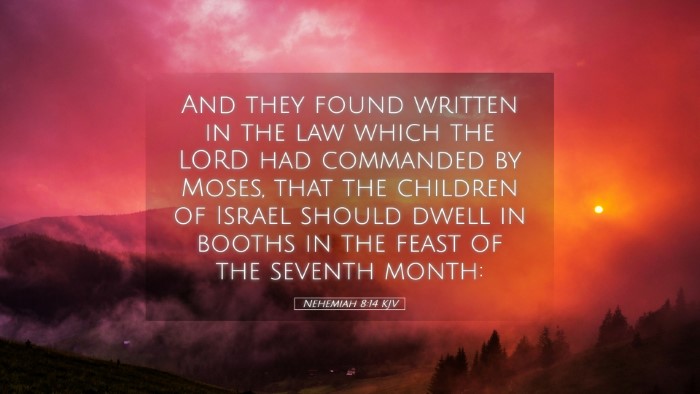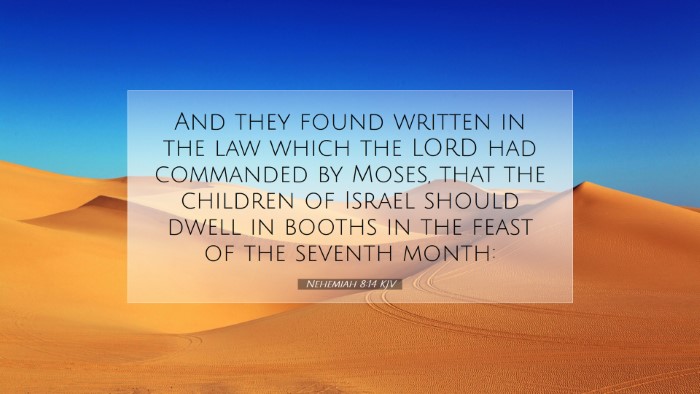Old Testament
Genesis Exodus Leviticus Numbers Deuteronomy Joshua Judges Ruth 1 Samuel 2 Samuel 1 Kings 2 Kings 1 Chronicles 2 Chronicles Ezra Nehemiah Esther Job Psalms Proverbs Ecclesiastes Song of Solomon Isaiah Jeremiah Lamentations Ezekiel Daniel Hosea Joel Amos Obadiah Jonah Micah Nahum Habakkuk Zephaniah Haggai Zechariah MalachiNehemiah 8:14
Nehemiah 8:14 KJV
And they found written in the law which the LORD had commanded by Moses, that the children of Israel should dwell in booths in the feast of the seventh month:
Nehemiah 8:14 Bible Commentary
Commentary on Nehemiah 8:14
Verse Reference: Nehemiah 8:14 - "And they found written in the law which the Lord had commanded by Moses, that the children of Israel should dwell in booths in the feast of the seventh month."
This particular verse reflects a significant moment in the history of the Israelites as they rediscover God's Law during the time of their return from exile. The following commentary synthesizes insights from esteemed public domain commentaries to mine the depth of this verse.
Historical Context
The Book of Nehemiah is situated at a crucial juncture in Jewish history, post-exilic period. After the destruction of Jerusalem, the Jewish people returned to their land, faced with the formidable task of rebuilding both their city and their spiritual identity. Nehemiah's leadership is pivotal in this restoration process, and his efforts culminate in a profound revival of faith among the people.
Finding the Law
The discovery mentioned in Nehemiah 8:14 is significant as it shows the people's renewed commitment to God's Word. Matthew Henry notes that the Israelites’ rediscovery of the Law was not mere historical research; it was a divine initiative that led to a spiritual awakening. This highlights the importance of Scripture in guiding a community's spiritual life.
- Spiritual Renewal: The act of finding the Law symbolizes a revival in the hearts of the people, indicating that the reading of Scripture has the power to transform lives.
- Community Awareness: The passage stresses the collective responsibility of the Israelites—what they found was not for individual edification alone but meant for communal observance and glorification of God.
The Command of God
The specific command regarding the Feast of Booths (or Sukkot) reflects God's desire for His people to remember their deliverance and dependence on Him. Albert Barnes emphasizes that this feast commemorates the Israelites' wandering in the wilderness, a time when they lived in temporary shelters. By observing this feast, the Israelites acknowledged God's providential care and guidance throughout their history.
- Significance of Booths: The booths represented both vulnerability and trust in God, as they were a reminder of their transient state during their journey to the Promised Land.
- Faith in God's Provision: It is a yearly reminder to remember God’s blessings and His willingness to provide for His people.
Theological Emphasis
Adam Clarke, in his commentary, highlights the theological implications of this verse for both ancient and modern readers. He notes that the command to dwell in booths serves as an emblem of God's ongoing covenant relationship with His people.
- Covenant Relationship: It reflects the unbreakable bond God has with Israel, emphasizing His faithfulness despite their shortcomings.
- God's Holiness and Our Response: The observance of feasts is not merely ritualistic; it is an act of holiness and sanctification in response to a holy God.
Application for Today
For pastors, students, theologians, and scholars, Nehemiah 8:14 serves as a call to diligence in understanding and applying God's Word in present-day ministry. The themes of community, remembrance, and reliance on God's commands are timeless.
- Importance of Scripture: Like the Israelites, today’s believers are called to rediscover and prioritize God’s Word in their lives and communities.
- Celebrating God’s Faithfulness: The observance of feasts and celebrations can foster a deeper communal identity and remembrance of God’s acts throughout history.
- Mentoring Future Generations: Engaging with the Word of God should include teaching younger generations the significance of God's commands, fostering a legacy of faith.
Conclusion
Nehemiah 8:14 encapsulates a moment of transformative discovery that leads to communal renewal in faith and practice. The engagement with God’s Word, as highlighted by prominent commentaries, emphasizes the necessity of Scripture in shaping the identity and spirituality of God's people. As modern readers reflect on this passage, the call remains—to dwell in the Word and celebrate the faithfulness of God in community.


